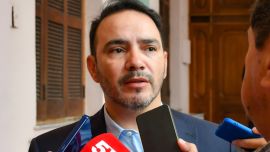Leftists, Kirchnerites, other Peronists and, on occasion, Radicals who pride themselves on their social sensibility, like blaming “capitalism” for the country’s many ills. So too do most “progressive” intellectuals. They all take it for granted that an economic system which fails to provide everybody with a decent livelihood should be replaced by something very different. For them, the big question is: what causes poverty?
For those of us who are unimpressed by the economic achievements of the various alternatives that have been tried out over the years, such individuals have got it all wrong. They overlook the indisputable fact that, throughout human history, most members of our species have had to endure extreme poverty and were lucky indeed to survive, in wretched conditions, for more than 30 or so years. In other words, poverty has always been normal, and the widespread prosperity which benefits most people that today can be found in many parts of the world is an aberration. This being the case, the only question worth asking is: what have some societies done to become prosperous enough to ensure that even most of those who contribute nothing positive to them receive enough to get by?
In Argentina, many politicians, including some who are currently in opposition, and those who take a partisan interest in what they are up to, assume that putting things this way is reactionary because it implies that they themselves are in large measure responsible for the plight of the growing proportion of the country’s inhabitants that scrapes a living below the official poverty line.
Their suspicions are well-founded. Had they, or the predecessors whose ideas, priorities and deeds they feel obliged to defend, applied policies similar to those which helped make other countries, including Italy and Spain – whose cultural traditions have much in common with Argentina’s – relatively rich, tens of millions of people living here would be far better off than they currently are.
In theory, playing catch-up should be fairly easy. If they wanted to, the country’s rulers could learn a great deal from what others have already done. But it would seem that, for them, recognising their own collective failure, and that of previous members of the political movements they belong to, would be far too painful to contemplate. By now, it should be plain to them that unless they change course everything will continue to get worse, but even though disaster is already in sight they refuse to deviate from the path they have chosen.
Just what lies ahead, unless they do change their ways, is plain enough: more poverty, more inflation, more violence, more crime, more corruption, more conflicts between the national government and provincial or municipal administrations and many more deaths directly or indirectly caused by the coronavirus. For Argentina to have any chance of avoiding the fate which is looming before her, she would need a government strong-minded enough to confront reality, but the possibility of this happening any time soon looks remote.
As well as being locked into the rigid presidential system imported in the 19th century from the United States (where, as recent events have reminded us, its shortcomings are evident), the country suffers from the determination of its most powerful politicians to subordinate just about everything else to the future well-being of Vice-President Cristina Fernández de Kirchner and her offspring. Though opinion polls suggest that she enjoys the support of less than 30 percent of the population, she still has enough leverage to make the government obey her every whim.
While it could be argued that, given the circumstances, it would make sense to grant her a free pardon for whatever she did when, for her at any rate, the going was good, in exchange for a solemn promise to let Alberto Fernández get on with the job with the backing of Peronist moderates and a big chunk of the opposition, nobody really believes it would be that easy for the country to escape from the tangled mess it has got itself into. For one thing, foreign countries, among them the US, would be unlikely to take kindly to what would be seen as a decision to institutionalise corruption. For another, thousands of zealous Kirchnerites who depend on her ability to win votes for their incomes and their place in the government or one of the country’s many overstaffed administrative bodies would be most reluctant to take an attempt to sideline them lying down.
However, even if Argentina did somehow manage to acquire a national unity government under the nominal leadership of Alberto, a man who, to judge from his record, would surely prove flexible enough to take a pragmatic approach to the many dire problems it would have to confront, deciding what to do would be anything but straightforward. Though experience has made it clear that, as the Chinese communists realised after years of Maoist madness, only capitalism can beat poverty, a democratic government cannot tell people that unless they learn to swim very quickly they will be left to sink.
For Argentina, this is a major problem. Just how many adults would be unable to do without handouts if these were cancelled and they had to depend on a less regulated economy is hard to say, but it is reasonable to suppose that about 30 percent of the population has been permanently incorporated into the “culture of poverty” political operatives have encouraged and would find it all but impossible to adapt. For some time now, the leaders of organisations set up to represent the poor have insisted that they want jobs, not charity, but few have the qualifications, whether formal or not, necessary for them to take advantage of the kind of jobs a modern economy requires; far too many are functionally illiterate.
Does this mean that Argentina is condemned to become a bloated version of Formosa Province, as the redoubtable essayist Juan José Sebrelli warned, or Venezuela? Not that long ago other countries, among them South Korea, were even poorer than Argentina is today, but thanks to hard work and a remorselessly practical ruling elite, they are now part of the developed world. But while genuine progress would at least be feasible if the people in charge of the country decided to follow the same route as South Korea, much of the political class, including the faction which is currently in power, is dead set on going in the opposite direction, the one which has already taken us to where we are today and which, if continued for much longer, could put a permanent end to whatever still survives of the once attractive Argentine dream.




















Comments